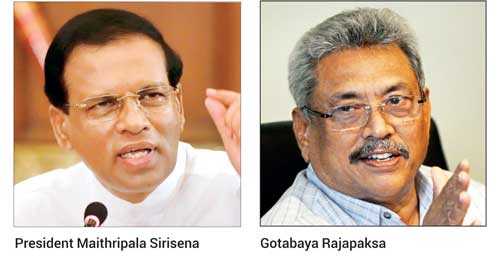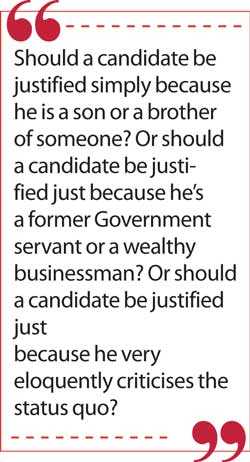Wednesday Feb 18, 2026
Wednesday Feb 18, 2026
Tuesday, 6 August 2019 00:24 - - {{hitsCtrl.values.hits}}
August is turning out to be a crucial month for Sri Lanka. The major political parties are planning to give a strong indication as to who their respective candidates would be for the all-important Presidential election later this year. While the focus is on personalities and alliances, little attention is given on policies and practicality of policies.
Should a candidate be justified simply because he is a son or a brother of someone? Or should a candidate be justified just because he’s a former Government servant or a wealthy businessman? Or should a candidate be justified just because he very eloquently criticises the status quo?
The recipe for failure
Sri Lanka’s history clearly shows the repercussions of that approach. The planning happens after being elected and hence valuable time is lost in the process. The difference in opinions within the alliance makes the planning process even longer and the final road map less effective. The eloquent critic while in opposition, realises the challenges once in power, and fails to do any better than the one he criticised so well.
The end result is the inevitable resort to typical vote buying measures such as Government sector salary increases and other hand-outs as the next election approaches and time has run out to do anything better. Such measures, although may win some votes at the election, puts the economy on an even weaker footing, making it that much harder for the successors.

Critically evaluate policy
Leaving aside the personalities, it would be important to focus on the policies put out by the different candidates.
The usual practise is to announce a wish list. A whole heap of measures is proposed covering almost all imaginable segments and sub segments. The focus is on the coverage of a wide breadth of issues rather than an in depth implementation plan for a handful of critical issues.
Neither there is a mention of how the measures would be implemented nor an evaluation of the availability of resources to successfully implement the measures. The reality is, resources are limited and therefore invariably such a comprehensive list of promises cannot be achieved.
The shallow proposals
The public on its part needs to be aware as to what tantamount to strong policies.
Government sector salary increases, free houses and other hand outs, although are seemingly enticing, should not be the core vision of a leader. Although better, development of infrastructure such as roads without a clear plan to increase the income level of the people is not ideal either.
To put it differently, no country in the world developed by such measures. In fact such measures should happen gradually when the country develops and not the other way around.
Characteristics of a vision
In contrast, a visionary leader with a practical plan should offer a methodology which could be implemented. In other words, it should focus on the few key issues and go into detail how it is proposed to be implemented along with an evaluation of resources needed for such implementation. Despite the lack of breadth, and in depth set of proposals need a greater deal of planning and preparation.
The global examples of successful nations over the last several decades give a few clear characteristics. They used geo-political factors as a catalyst, the development was achieved by developing specific industries which provided employment and boosted income. They didn’t focus on improving all economic variables especially in the initial years, as it is not practical and such an approach greatly handicaps in making significant progress on the critical variables which needs to be improved urgently.
The implementation team
While strong policy is the primary requirement, the secondary requirement is whether the candidate has a team capable of implementing. A past track record of successful implementation would be ideal, although some who didn’t get an opportunity should be held as neutral – they could be good implementers or could be otherwise.
In the absence of a candidate with a visionary set of policies, the public could be compelled to go for a candidate with a stronger track record in implementation. However the ideal scenario would be to have a leader who has both a visionary plan and a team capable of implementing it.
Will it continue to be a dream or will it finally be a reality?
(The writers could be contacted via [email protected].)